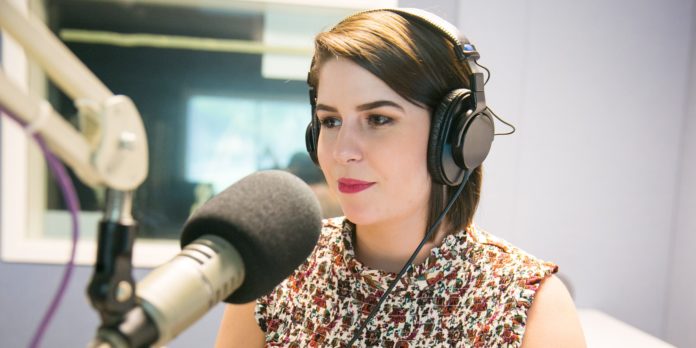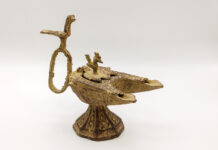Katie Atkinson wasn’t alive when Neil Armstrong first set foot on the moon on July 20, 1969. But as the world marks the 50th anniversary of that momentous event, the recent Mercer University graduate is telling the stories of those who witnessed it and made it happen.
In a new podcast, “NASA Explorers: Apollo,” Atkinson shares the lesser known stories of the thousands of people who worked behind the scenes of the moon landing and the scientists who are still helping us learn about it today. Podcast listeners also hear stories about memories of the moon landing from those who watched it on TV.
“We wanted to make sure we were representing some people who aren’t normally thought of, in my opinion, when it comes to telling the Apollo story,” said Atkinson, the lead producer for the series.
Atkinson, who graduated in May with her Bachelor of Arts in journalism, started work on the series last summer, before she was even out of college. At the time, she was an audio storytelling intern at NASA’s Goddard Flight Center in Maryland, creating short audio features.
During her internship, she was approached by the planetary team at NASA about doing something for the 50th anniversary of the moon landing. The idea of a podcast developed.
“We wanted to tell the story a different way and make it entertaining to listen to,” she said. “We didn’t want to tell the same story over and over.”
Atkinson’s internship ended, but she continued working on the series during her senior year at Mercer. She took phone calls and worked on production in between classes, regularly communicating with her teammates back in Maryland.
She even got one of Mercer’s journalism classes involved, working with a digital audio class taught by Adam Ragusea, journalist-in-residence and assistant professor of practice.
Some of the students’ work made it into the podcast, which was released June 19 at nasa.gov/nasa-explorers-apollo. It’s also on Soundcloud, Apple Podcasts, Google Play and Facebook Watch.
Atkinson’s success is “precisely what you hoped for your students. And maybe it’s beyond anything I hoped any one of them would achieve so soon after graduation,” Ragusea said.
“What I think it speaks to is not just Katie’s talents as a media creator but more than that, her natural leadership ability, which is something she was able to express time and time again here at Mercer. She is someone who, I think, views leadership as service and is really effective at bringing teams together.”
After graduation, Atkinson returned to NASA, where she’s now an audio producer. She said her education at Mercer and her internships prepared her well for the job.
“I feel like the Center for Collaborative Journalism gave me a good basis for understanding audio production and sound design,” Atkinson said. “At Mercer, I learned how to tell a story effectively, and I think that’s really key when you’re doing any sort of project, whether it’s audio or written.”
While at Mercer, Atkinson also interned at Georgia Public Broadcasting, a partner with the CCJ. That was where she fell in love with audio storytelling. After her internship ended, she continued to work with GPB as part of a practicum and as a volunteer. The experience was invaluable.
“Working at the public radio station, you learn how to break down really complex topics in a conversational, casual way for general audiences,” she said.
That was important with the Apollo podcast; Atkinson didn’t want her audience to need a lot of scientific understanding to appreciate it.
Grant Blankenship, features editor and multimedia reporter for GPB, said as a student Atkinson took every opportunity she had and then some.
“She grabbed the opportunities available to her at the CCJ with both hands and just maximized every single one of them,” he said. “She didn’t wait for someone to ask her to produce radio stories. She just did it.”
And what does he think of the Apollo podcast?
“What do I think? I was going to say I’m over the moon, but that’s so cheesy.”










